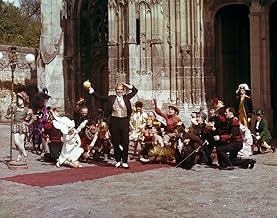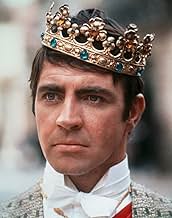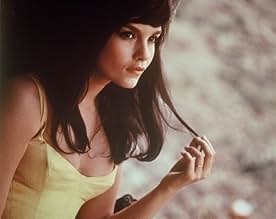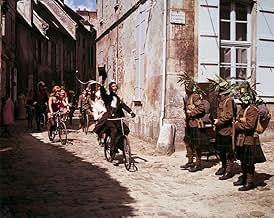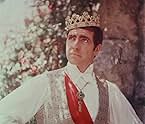IMDb रेटिंग
7.3/10
4.6 हज़ार
आपकी रेटिंग
अपनी भाषा में प्लॉट जोड़ेंDuring World War I, a British private, sent ahead to a French town to scout for enemy presence, is mistaken for a King by the colorful patients of an insane asylum.During World War I, a British private, sent ahead to a French town to scout for enemy presence, is mistaken for a King by the colorful patients of an insane asylum.During World War I, a British private, sent ahead to a French town to scout for enemy presence, is mistaken for a King by the colorful patients of an insane asylum.
- निर्देशक
- लेखक
- स्टार
Pier Paolo Capponi
- Un Officier Anglais
- (as Paolo Capponi)
Georges Adet
- L'aliéné-docteur
- (बिना क्रेडिट के)
Jackie Blanchot
- Le Gabalou
- (बिना क्रेडिट के)
Robert Blome
- Un aliéné
- (बिना क्रेडिट के)
Jean-Marie Bon
- Un aliéné
- (बिना क्रेडिट के)
फ़ीचर्ड समीक्षाएं
A charming film, first, for the contained naked truth. Second, for status of reflection in mirror of near reality, in too many senses. Not the last, for acting and the veil of innocence and cold / precise perspective about life, freedom, expectations, fears , joy in pure state. A film deserving to be loved and seen often. As a sort of cure. So, Alan Baits and Genevieve Bujold. And the others. A cold perspective, seeming a kind of verdict, about reality and its large illusions.
De Broca's delightful and surreal anti-war fantasy quickly attained a cult status when it was first released, but in recent years it has dropped more and more out of sight. A shame, because it is a charming film, the whimsical, romantic nature of which is entirely French. Even though the underlying message, that of preferring one kind of insanity to another is a simple, absurdist one, the viewer is still carried along by the Gaullic charm of it all.
As the much-put-upon martial ornithologist, It's not just because Bates is the only English member of the cast that one is aware of some awkwardness in his casting. For English cinema goers in particular, familiar with his career, his usual jocular masculinity is hard to reconcile with an child-like character, swept along by events. Those who remember Bates and Oliver Reed wrestling nude in 'Women in Love' (1962) from the same period, or his cocky Vic in 'A Kind of Loving' (1962), may bulk at Bates portraying such a confused innocent. Having said that, Bates' actual performance is balanced and restrained, all of a piece with the rest of the cast.
'King of Hearts' is primarily an ensemble piece. Many of the film's most delightful moments spring from the fancy-filled and flirtatious lunatics who quickly fill the streets, shops and occupations left by the fleeing villagers, their interaction with each other, and Plumpick. This world of fantasy is curtailed by the village walls, which physically as well as mentally encircle their environment. Outside is reality (no matter how ludicrously it is presented), conflict, death. Inside the walls is harmony of sorts, life celebrated. This distinction between outside and inside is made clear in the film. As soon as Plumpick attempts to ride a horse back into the real world for help, the music and the mass accompaniment of him by the inmates has to end until he is obliged to return.
As the 'King of Hearts' Plumpick is at the center of his motley 'people', as well as of Coquelicot's (Geneviève Bujold) affections. Once he awards himself his name, in a panic and on the run, his 'subjects' call out for him. He is promptly 'crowned' (both by banging his head, inducing his initial confusion, and though acquiring his 'kingship'). He is awarded a bride, and accepted as an unique traveller into the society of the amiably mad. Their acceptance of him anticipates the final scene of the film, when a chastened Plumpick re-admits himself into their company, having rejected the larger insanity of warfare.
It's fitting in a way that the least successful parts of the film lay outside of the village, where comic stereotypes replace whimsy and the comedy is drawn with much broader strokes. In particular Colonel MacBibenbrook (Adolfo Celi, better known as Emil Largo in 'Thunderball') is uncomfortably close to parody, and his part would have been much better cast with an actor like Trevor Howard who could excel with a line in ironic bombast. The Germans fare no better and, although amusing and lightweight in their capers, one misses the delicacy with which the lunatics are portrayed. One suspects that De Broca associates more with the geniality of the insane, as we all do given the options, and this sympathy is reflected on screen
Tellingly, the lunatics are not completely oblivious to the hostile world which surrounds them, although they are content to ignore the immediate threat of destruction and Plumpick's warnings. At the end of the film, once the opposing forces have symbolically destroyed themselves, Marcel says:'I'm tired of this game, let's go back to our rooms'. With deliberate sadness, they divest themselves of their play robes and return to their asylum, a divestment scene at the same time quiet, serious and eminently sane. It is clear that they are mad - but not crazy.
As the much-put-upon martial ornithologist, It's not just because Bates is the only English member of the cast that one is aware of some awkwardness in his casting. For English cinema goers in particular, familiar with his career, his usual jocular masculinity is hard to reconcile with an child-like character, swept along by events. Those who remember Bates and Oliver Reed wrestling nude in 'Women in Love' (1962) from the same period, or his cocky Vic in 'A Kind of Loving' (1962), may bulk at Bates portraying such a confused innocent. Having said that, Bates' actual performance is balanced and restrained, all of a piece with the rest of the cast.
'King of Hearts' is primarily an ensemble piece. Many of the film's most delightful moments spring from the fancy-filled and flirtatious lunatics who quickly fill the streets, shops and occupations left by the fleeing villagers, their interaction with each other, and Plumpick. This world of fantasy is curtailed by the village walls, which physically as well as mentally encircle their environment. Outside is reality (no matter how ludicrously it is presented), conflict, death. Inside the walls is harmony of sorts, life celebrated. This distinction between outside and inside is made clear in the film. As soon as Plumpick attempts to ride a horse back into the real world for help, the music and the mass accompaniment of him by the inmates has to end until he is obliged to return.
As the 'King of Hearts' Plumpick is at the center of his motley 'people', as well as of Coquelicot's (Geneviève Bujold) affections. Once he awards himself his name, in a panic and on the run, his 'subjects' call out for him. He is promptly 'crowned' (both by banging his head, inducing his initial confusion, and though acquiring his 'kingship'). He is awarded a bride, and accepted as an unique traveller into the society of the amiably mad. Their acceptance of him anticipates the final scene of the film, when a chastened Plumpick re-admits himself into their company, having rejected the larger insanity of warfare.
It's fitting in a way that the least successful parts of the film lay outside of the village, where comic stereotypes replace whimsy and the comedy is drawn with much broader strokes. In particular Colonel MacBibenbrook (Adolfo Celi, better known as Emil Largo in 'Thunderball') is uncomfortably close to parody, and his part would have been much better cast with an actor like Trevor Howard who could excel with a line in ironic bombast. The Germans fare no better and, although amusing and lightweight in their capers, one misses the delicacy with which the lunatics are portrayed. One suspects that De Broca associates more with the geniality of the insane, as we all do given the options, and this sympathy is reflected on screen
Tellingly, the lunatics are not completely oblivious to the hostile world which surrounds them, although they are content to ignore the immediate threat of destruction and Plumpick's warnings. At the end of the film, once the opposing forces have symbolically destroyed themselves, Marcel says:'I'm tired of this game, let's go back to our rooms'. With deliberate sadness, they divest themselves of their play robes and return to their asylum, a divestment scene at the same time quiet, serious and eminently sane. It is clear that they are mad - but not crazy.
"Le Roi De Coeur" belongs to a handful of French movies which are much more known and praised abroad (another example comes to mind:"Cybèle Ou Les Dimanches De Ville D'Avray").
In France the audience snubbed it and the critics panned it;De Broca was famous for his entertaining (not meant pejoratively)works ,such movies as "Cartouche" "L'Homme De Rio" "Les Tribulations D'Un "Chinois" En Chine" were huge blockbusters and the people were not ready for "something different"..
When he tried something different,nobody understood and the director felt compelled to return to more "accessible" stories ("Le Diable Par La queue" etc);that's why" Le Roi De Coeur" has remained unique ,very original;in the past of the French cinema,to my knowledge ,only one movie mixed the war and an insane asylum (Raymond Bernard's "Un Ami Viendra Ce Soir");Bernard's movie had good potential (who are the loonies?) which he lost in a trite patriotic finale.
Broca goes all the way:in a world gone mad, the only safe place,where people have remained sensible,is an insane asylum!the last picture -which may have inspired the ending of the much more conventional "rain man" -is revealing;this is one of the most extraordinary demonstration of the absurdity of war .
Broca had done what Richard Lester tried to do (but was not able to)in his "how I won the war" :a crazy movie in which madness rules but has its own internal logic ;terrific French cast plus English Alan Bates -who loves birds and thus is a potential pacifist plus Italian Adolfo "Largo" Celi as an English major plus gorgeous Canadian Genevieve Bujold as Coquelicot (=Poppy!).
In France the audience snubbed it and the critics panned it;De Broca was famous for his entertaining (not meant pejoratively)works ,such movies as "Cartouche" "L'Homme De Rio" "Les Tribulations D'Un "Chinois" En Chine" were huge blockbusters and the people were not ready for "something different"..
When he tried something different,nobody understood and the director felt compelled to return to more "accessible" stories ("Le Diable Par La queue" etc);that's why" Le Roi De Coeur" has remained unique ,very original;in the past of the French cinema,to my knowledge ,only one movie mixed the war and an insane asylum (Raymond Bernard's "Un Ami Viendra Ce Soir");Bernard's movie had good potential (who are the loonies?) which he lost in a trite patriotic finale.
Broca goes all the way:in a world gone mad, the only safe place,where people have remained sensible,is an insane asylum!the last picture -which may have inspired the ending of the much more conventional "rain man" -is revealing;this is one of the most extraordinary demonstration of the absurdity of war .
Broca had done what Richard Lester tried to do (but was not able to)in his "how I won the war" :a crazy movie in which madness rules but has its own internal logic ;terrific French cast plus English Alan Bates -who loves birds and thus is a potential pacifist plus Italian Adolfo "Largo" Celi as an English major plus gorgeous Canadian Genevieve Bujold as Coquelicot (=Poppy!).
10RDenial
As I was reading through the comments here for "King of Hearts" I noticed two different schools of thought on the film. Many, like myself, have fond memories of seeing this film in the 60s and 70s and were delighted by it. The other comments come from younger viewers who see this film as being "dated" and not that funny, yet worthwhile viewing. At first I was a little miffed at this generations comments about a gem of my generation, until it dawned on me that they were somewhat correct. The film is a bit dated because they just do not make films like this anymore. It was never meant to be knee slapping funny. The humor was a non-intrusive "gentle" humor that seems to be a foreign concept in this day and age. Another reason many younger viewers do not "get" this film is because one of the themes here is non-conformity. This was a crucial concern of those growing up in the 60s. We wanted our individuality to show and not be just a number. Society has did a 180 since then. Today people are more concerned with fitting in than standing out. So yes, this film possibly is a bit dated. It is a bit of movie magic from a far simpler time and I have a feeling that there are a lot of people under 30 who would not see this as dated at all. King of Hearts is one of a small handful of films that celebrates the simple magic of being alive. Come and experience it.
It's World War I, and a Scottish Private named Plumpick (Alan Bates) is ordered to infiltrate a French village and stop a bomb that the Germans have planted from going off. Upon arriving, Plumpick discovers the entire village deserted, except for the patients of the local insane asylum, who have been left behind. The patients soon escape the asylum, play dress-up with the various clothes they find lying around the village, and take it over. Not only this, but they crown Plumpick their king! With the German army still in the vicinity nearby, Plumpick must find the bomb, diffuse it, and save his "subjects" from certain death....
An all-time foreign film classic, "Le Roi De Coeur," aka "King Of Hearts," is a marvelous movie, full of sweetness, charm, and both clever comedy & fine drama that also comments very well on the stupidity of war. Alan Bates, who sadly passed away recently, is simply wonderful as Private Plumpick, as is the lovely Genevieve Bujold as the young patient named Poppy that Plumpick falls for, and Adolfo Celi is quite funny as Plumpick's stuffy superior officer. The rest of the film's big ensemble cast, whether playing the asylum patients or various soldiers, are all excellent, too.
The only thing that stops "King Of Hearts" from being perfect is that it *could* very well be argued that the insane asylum patients in this movie aren't...well, *insane* enough. They may speak strangely to one another or to Private Plumpick, but, for the most part, they act & behave quite coherently. But other than that, "King Of Hearts" is a very charming foreign film, and one of the very best films of the late, great Alan Bates. Definitely seek this one out.
An all-time foreign film classic, "Le Roi De Coeur," aka "King Of Hearts," is a marvelous movie, full of sweetness, charm, and both clever comedy & fine drama that also comments very well on the stupidity of war. Alan Bates, who sadly passed away recently, is simply wonderful as Private Plumpick, as is the lovely Genevieve Bujold as the young patient named Poppy that Plumpick falls for, and Adolfo Celi is quite funny as Plumpick's stuffy superior officer. The rest of the film's big ensemble cast, whether playing the asylum patients or various soldiers, are all excellent, too.
The only thing that stops "King Of Hearts" from being perfect is that it *could* very well be argued that the insane asylum patients in this movie aren't...well, *insane* enough. They may speak strangely to one another or to Private Plumpick, but, for the most part, they act & behave quite coherently. But other than that, "King Of Hearts" is a very charming foreign film, and one of the very best films of the late, great Alan Bates. Definitely seek this one out.
क्या आपको पता है
- ट्रिवियाWhile the film was a flop with critics and audiences in France, it was an unexpected cult success in the USA, running for years in Boston repertory film houses circa 73-76. Midnight showings around the country made it an early cult film, like रॉकी हॉरर पिक्चर शो (1975), Eraserhead (1977), El Topo (1970), Beyond the Valley of the Dolls (1970), etc...
- गूफ़The stairs/ladder Plumpick uses to climb to the top of the blockhouse appear out of nowhere.
- भाव
[last lines]
Le Duc de Trèfle: The most beautiful journeys are taken through the window.
- क्रेज़ी क्रेडिटThe credits rise and then fall to coincide with the sound of a large clock.
- कनेक्शनReferenced in सेविंग प्राइवेट रायन (1998)
- साउंडट्रैकLa Valse Tordue
Written and Performed by Georges Delerue Et Son Orchestre
टॉप पसंद
रेटिंग देने के लिए साइन-इन करें और वैयक्तिकृत सुझावों के लिए वॉचलिस्ट करें
- How long is King of Hearts?Alexa द्वारा संचालित
विवरण
- रिलीज़ की तारीख़
- कंट्री ऑफ़ ओरिजिन
- भाषाएं
- इस रूप में भी जाना जाता है
- Le Roi De Coeur
- फ़िल्माने की जगहें
- Senlis, Oise, फ़्रांस(insane asylum and town square scenes, Senlis is 55 km north of Paris)
- उत्पादन कंपनियां
- IMDbPro पर और कंपनी क्रेडिट देखें
बॉक्स ऑफ़िस
- US और कनाडा में सकल
- $17,646
- US और कनाडा में पहले सप्ताह में कुल कमाई
- $3,443
- 25 फ़र॰ 2018
- दुनिया भर में सकल
- $18,130
इस पेज में योगदान दें
किसी बदलाव का सुझाव दें या अनुपलब्ध कॉन्टेंट जोड़ें



![Trailer [OV]](https://m.media-amazon.com/images/M/MV5BOTgyNWQ0NTctZWY1Mi00NzY1LTljNWItMWFlNjI2MDMzM2NmXkEyXkFqcGdeQXRyYW5zY29kZS13b3JrZmxvdw@@._V1_QL75_UY281_CR79)

